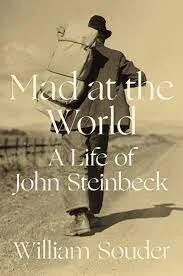REVIEW: A New Biography of John Steinbeck, 'America's Most Pissed Off Writer'
/Mad at the World: A Life of John Steinbeck by William Souder (W. W. Norton)
By Jim Swearingen
So many of the greatest artistic geniuses are best admired at a lifetime’s length. Grappling with the Muses can entail a level of self-absorption that precludes humane behavior toward their closest friends, partners, even their own children.
John Steinbeck is no exception to that dictum as 2005 Pulitzer finalist William Souder illustrates in his new biography, Mad at the World. Steinbeck’s mania and addictions, while fueling some of the starkest American depictions of the Great Depression and social injustice, also made him a beastly companion. He was another of those mad savants whose petty and felonious torments we must overlook to give his work an impartial audience.
From his lifelong infatuation with Arthurian legends to his own tales of male wandering and failing, Steinbeck was ever obsessed with mankind’s struggle against abusive power. Despising conventionality and chafing at brutality, his protagonists always find a hard-scrabbled dignity as they defy the indifferent authority of foremen, cops, bankers, anyone who has the power to give while preferring to take.
Unfortunately, when an American writer comes along who not only recognizes the misfortunes of others, but also the vested interests that mete out that misfortune, he or she can expect to be labeled disloyal, a radical, a Communist. Steinbeck’s well-documented fellow-traveling earned him an FBI file that nixed an Army commission in World War II.
Mad at the World also chronicles Steinbeck’s riveting 66-year race toward self-destruction. The appetite with which he wrote, fought, traveled, and imbibed makes for a good read. One loses count of his homes, dogs, love affairs, cocktails, personal conflicts, and bouts of loathful self-doubt. Here, too, are his adventures in combat, migrant camps, and the hills above the Salinas Valley that provided the grit and grist for his tales of men struggling to eke out a meaning alongside their living.
Souder brings to the book an empathetic appreciation of a writer’s angst, the haunting, oscillating fears that his work will never gel, or that it will never be appreciated, or that an eventual success will ruin his drive to repeat it. He captures the feverish toil behind Steinbeck’s work while unflinchingly reporting his irascible, neurotic, and cruel behavior towards editors, critics, friends, wives, and sons. The brutality he exercised on his sons, in particular, would make anyone despise the man.
Souder captures the raucous personality of a prolific and ferocious artist. Steinbeck was, by his own account, “unwilling to surrender fierceness for a small gain in yardage,” wedging Herculean periods of creativity between bouts of hard drinking, womanizing and eventually, amphetamine abuse. Similar to a dozen other compulsive American writers, Steinbeck’s erratic behavior betrays a deep-seated insecurity and likely chronic depression.
Steinbeck’s frequent dejection, nightmares, and mood swings may have stemmed from a vaguely documented combat injury suffered during the Allied invasion of Italy that left the writer with a severe concussion and two busted eardrums. Souder’s speculation includes recent advances in our understanding of traumatic brain injuries and their impact on human behavior.
One wonders what the latest research into emotional trauma and PTSD might also contribute to understanding Steinbeck’s demons. The “manly” familiarity with war and slaughter that he felt he had missed in the First World War, but was finally able to achieve as a correspondent in World War II, we now know carries haunting psychological scarring that can result in deep mistrust, paranoia, nightmares, and addictions.
Souder calls Steinbeck “America’s most pissed off writer.” Certainly, one is hard-pressed to think of an angrier White novelist when it comes to issues of economic and social justice. If America still thirsts for that justice, a questionable assertion in our times, the longing runs back through the Depression and, in American letters, straight through the novels of John Steinbeck.
Jim Swearingen is a Minneapolis-based writer whose work has appeared in The National Book Review, The Huffington Post, Salon, and the Minneapolis Star Tribune.










